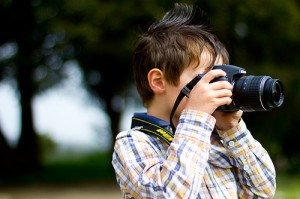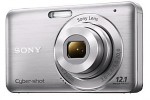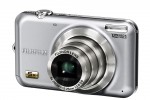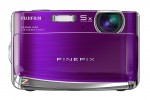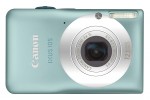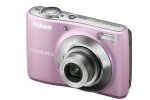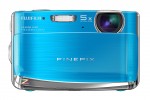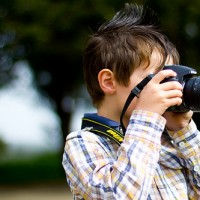
Here at Small Aperture, we like to get them hooked on photography when they’re young. That’s hardly surprising given that I’ve been in love with photography since I was about five, when my father taught me how to use an Olympus Trip. Soon afterwards, I was given my own 118 film camera, and in fact, I still have the photos I took with it.
But entry-level cameras today are a touch different from those twenty-five years ago. So where would you start if you wanted to buy something for a photographically inclined little one? Well whaddya know? I’ve done some research, I’ve trawled the High Street, I’ve asked lots of questions, and I think that I have some answers. (Yes, just in time for Christmas.)
Now, first things first. I’m no more inclined to suggest that you buy a ‘children’s camera’ for a small person than I am likely to endorse feeding her or him reconstituted meat shaped into dinosaurs and covered with breadcrumbs. Some things in life are worth doing properly from the get-go, and food and photography are two of those. This also means I don’t think that there needs to be a lower age limit on when to give a little one a camera; if your nephew is showing photographic talent at six, let him run with it – using a proper camera.
All the same, a dSLR might not be exactly what he needs. So I based my cameras-for-kiddies selection on five criteria.
The Criteria
Price
There are plenty of decent point-and-shoot cameras out there for under £100, but none for under £50. Spending somewhere between the two seems reasonable, so that was my budget.
Build
If you give something to a kid, it needs to be able to withstand a few bumps and knocks. Even if she or he does treat it with respect, accidents can still happen. Hell, I managed to fling my iPhone across the pavement last week. I was looking for a camera that felt sturdy, durable, and would be comfortable in little hands.
Design
The layout needs to be simple, the controls can’t be fiddly, and it has to look shiny. I want my camera to be relatively easy to use; the same goes for a camera used by young ‘un. And if I can carry a metallic red point-and-shoot in my handbag, then my imaginary seven year old niece can have one, too.
Toys and features
Of course it needs toys. And video. Duh!
Image quality
If we’re encouraging kids to take photos, to enjoy the process, and to be proud of what they produce, the image quality needs to be decent. Eight megapixels is plenty and if we’re lucky enough to lay our grubby mitts on some image stabilisation or anti-blur technology, then so much the better.
So to which cameras did these criteria lead me?
The Yeses
I saw a couple of cameras that I’d be prepared to buy for my imaginary niece. Despite its complete mouthful of a name, the Sony Cyber-shot DSC-W310S is shiny (in silver, black, or red), it has an easy-to-use interface, the layout is clear, it has image stabilisation goodness, and it has a film mode. It costs somewhere around £90.
The Fujifilm JX200 hit all the buttons with a swish, sleek metal body, easy interface, 12 megapixel sensor, low-light sensitivity, 5x optical zoom, film mode, and image stabilisation prowess. What made it stand out from the crowd was its panorama mode. Stitched-together-pictures-R-Us! All for around £80.
There was one camera that I kept going back to, though. Admittedly it might have been because it was purple, but it might have been because of the groovy on-off mechanism. Sliding down the front panel reveals the lens and powers up the Fujifilm Z70. And no, I wasn’t overlooking any of the other criteria because I was captivated by its shiny purple slidiness. It makes films, it has auto-focus tracking, it has a 12 megapixel sensor, there’s image stabilisation, the layout was clear, and the screen was large. All for around £90. (And it comes in four colours other than purple.)
The Nos
There are heaps of cameras that didn’t make the cut, for various reasons. You’d be very bored if I listed them all. Still, two deserve a special mention, so that you can steer well clear of them.
The Vivitar X225. I was convinced that just by picking it up, I might break it. At around £50, it is cheap, but I can only conceive this as a false economy.
The Samsung ES25. The zoom button on this irritated me. I can’t think that a seven year old would be any less irritated, either.
The Maybes
The Canon Powershot A495 is a great camera, but I wasn’t convinced that its plastic build was sturdy enough, even if it is excellent value at around £70. If you really want a Canon and their range of intriguing colours, the Ixus 105 is coming in at just over £100. Shop around and you might be able to get a deal.
Not to be outdone by Canon, Nikon also have some impressively specced entry-level cameras. On paper, the Nikon L21 and L22 offer just about everything, and at around £70 they don’t cost the earth. However, I wasn’t convinced they’d be durable enough. And I wasn’t convinced by the colours, either, but that’s me.
The conclusion
There are a lot of cameras out there for under £100 that would be ideal to give to give to a young one to let her or him explore photography. There are some shockers, too. But I’m still loving the slidable on-off function on the Fujifilm Finepix Z70. That’d be my first option. Then you just wonder how long it’ll be before she or he is asking for an SLR.
With very many thanks to John Lewis on Oxford Street, and especially Andy in the Audio-visual department. With significantly fewer thanks to various other camera purveyors on Oxford Street who were far from helpful. (Yes, I braved Oxford Street for this. No wonder I’ve spent the weekend at the Small Aperture country retreat, recuperating.)






